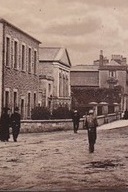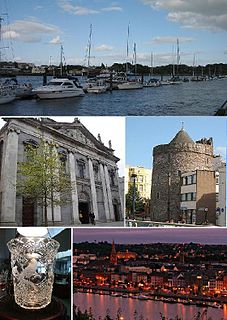
Waterford is a city in Ireland. It is in County Waterford in the south-east of Ireland and is located in the province of Munster. The city is situated at the head of Waterford Harbour. It is the oldest and the fifth most populous city in the Republic of Ireland. It is the tenth most populous settlement on the island of Ireland. Waterford City and County Council is the local government authority for the city. According to the 2016 Census, 53,504 people live in the city, with a wider metropolitan population of 82,963.
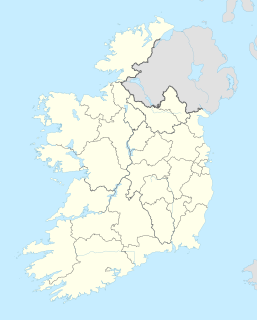
Dungarvan is a coastal town and harbour in County Waterford, on the south-east coast of Ireland. Prior to the merger of Waterford County Council with Waterford City Council in 2014, Dungarvan was the county town and administrative centre of County Waterford. Waterford City and County Council retains administrative offices in the town. The town's Irish name means "Garbhann's fort", referring to Saint Garbhann who founded a church there in the seventh century. The town lies on the N25 road, which connects Cork, Waterford and Rosslare Europort.
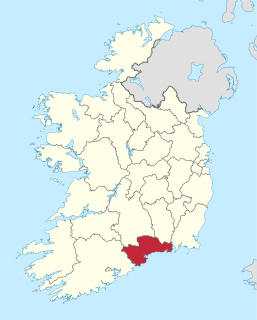
Waterford County Council was the authority responsible for local government in County Waterford, Ireland. The remit of Waterford County Council also included some suburbs of the Waterford city not within the remit of Waterford City Council. As a county council, it was governed by the Local Government Act 2001. The council was responsible for housing and community, roads and transportation, urban planning and development, amenity and culture, and environment. The council had 23 elected members. Elections were held every five years and were by single transferable vote. The head of the council had the title of Mayor. The county administration was headed by a County Manager. The county town was Dungarvan.

North Tipperary County Council was the authority responsible for local government in the county of North Tipperary, Ireland. The council had 21 elected members. The head of the council had the title of Mayor. The county town was Nenagh.

Tallow is a town in County Waterford, Ireland. Tallow is in the province of Munster near the border between County Cork and County Waterford and situated on a small hill just south of the River Bride.

Armagh Courthouse is a judicial facility in Armagh, County Armagh, Northern Ireland. The courthouse, which accommodates hearings for the local magistrates' courts and county courts, is a Grade A listed building.
This article deals with transport in Waterford city in Ireland. The city is connected by road, rail, bus, air and sea. There are currently proposals for a bus rapid transit (BRT) system, consisting of bus trams, or streetcars, to be used in future.
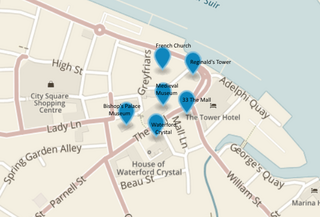
The Waterford Viking Triangle is part of the cultural and heritage area in Waterford City. It is so called because of the 1000-year-old Viking walls which once surrounded it. Perhaps the most famous building in the triangle is Reginald's Tower but the triangle is also the site of the Medieval Museum and the Bishop's Palace Museum, collectively known as Waterford Museum of Treasures.

Naas Courthouse is a judicial facility in Main Street, Naas, County Kildare, Ireland.

Kilkenny Courthouse, also known as Grace's Castle, is a judicial facility in Parliament Street, Kilkenny, County Kilkenny, Ireland.

Monaghan Courthouse is a judicial facility in Monaghan, County Monaghan, Ireland

Nenagh Courthouse is a judicial facility at Banba Square in Nenagh, County Tipperary, Ireland.
The Civic Offices is a municipal facility on Limerick Road in Nenagh, County Tipperary, Ireland.

Clonmel Courthouse was a judicial facility in Clonmel, County Tipperary, Ireland.
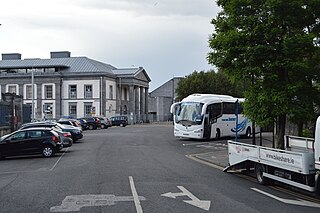
Limerick Courthouse is a judicial facility at Merchant's Quay, Limerick, County Limerick, Ireland.
The Civic Offices is a municipal facility in Dooradoyle, Limerick, County Limerick, Ireland.

Waterford Courthouse is a judicial facility in Catherine Street, Waterford, County Waterford, Ireland.

The Civic Offices is a municipal facility at Davitt's Quay in Dungarvan, County Waterford, Ireland.

County Hall is a municipal facility at Galgorm Road in Ballymena, County Antrim, Northern Ireland. It served as the headquarters of Antrim County Council from 1970 to 1973.

County Buildings is a municipal facility in East Bridge Street, Enniskillen, County Fermanagh, Northern Ireland. It served as the headquarters of Fermanagh County Council from 1960 to 1973.
